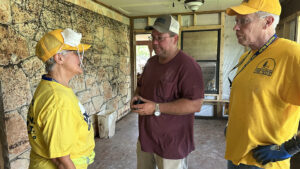
LITTLE ROCK, Ark. (BP)–The Great Commission Resurgence (GCR) Task Force, assigned to explore ways to make the Southern Baptist Convention more effective in reaching and discipling people, released its interim progress report Feb. 22. One of the six components of the report recommends phasing out the North American Mission Board (NAMB) “cooperative agreements” with state conventions over the course of four years to free up money for a national strategy.
What are those cooperative agreements? If they are phased out, what would it mean for Arkansas Baptists?
Here’s how it all works now. Each Southern Baptist church determines what percentage of its undesignated receipts it gives for Baptist causes through the Cooperative Program (CP). State Baptist conventions receive those CP contributions from churches and determine what percentage of CP funds support ministries within the state and what percentage goes to SBC ministries. In Arkansas, 57.63 percent funds state ministries, while 42.37 percent funds SBC ministries.
NAMB receives 22.79 percent of the SBC portion. Then, through cooperative partnership agreements, NAMB and state conventions jointly support missionaries and specific ministry projects within each state. In Arkansas, the Arkansas Baptist State Convention (ABSC) funds 65 percent of such joint ventures, while NAMB funds the other 35 percent.
In other words, NAMB and state conventions join hands, working together to plant churches and reach people in each state for Christ.
About $500,000 a year would be lost to mission efforts in Arkansas if the cooperative agreements are phased out, according to Emil Turner, ABSC executive director.
“Disaster relief and church planting would be among the ministries defunded,” he said. “I agree with every one of the goals of the task force report, but I have some reservations about the strategies. We do need a revival in our churches. We do need to focus on reaching urban centers in North America. We do need to increase the number of people who tithe in our churches, and we do need to increase the commitment to the Cooperative Program in our churches…. I am in total agreement with these goals. The strategies outlined in the report, however, raise some concerns.”
Cooperative agreements support nine ABSC missions ministries team members and three Baptist Collegiate Ministry (BCM) assistants. Within Arkansas, they also fund disaster relief work, church planting, hunger fund projects, Hispanic ministries, summer missionaries, trucker chaplains and trucker chapels, associational missions projects, the evangelism and church growth conference, Vacation Bible School (VBS) training, associational training and the Reaching Generation Now emphasis.
“There are jointly funded missionaries all across the United States in the 42 different conventions,” explained Robby Tingle, ABSC missions ministry team leader.
He explained that individuals in Arkansas who are jointly sponsored don’t serve in administrative jobs. “They work in areas like church planting, disaster relief and church and community missions, helping the church engage its community,” Tingle said. “Cooperative agreement translates into people who are doing effective ministry reaching people for Christ. It always translates into missions.”
Tingle pointed out that NAMB only supports some of those individuals by a limited dollar amount, which means the ABSC supports those positions by more than 65 percent.
“What the GCR proposal would do to church planting in Arkansas is that NAMB would defund our ability to support new church starts at the current level,” Tingle said. “Right now we are assisting 46 church planters with pastoral assistance. The GRC recommendation would defund it.”
David James, ABSC collegiate ministries team leader, said phasing out cooperative agreements would hamper reaching international college students in Arkansas.
“One of the things we’re committed to is trying to reach the world,” James said. “At UCA (University of Central Arkansas], there is a new Chinese studies program with a large number of Chinese students. Our [jointly funded] BCM assistant is very involved in international ministry. So we would lose a person who helps us reach the international students.”
A similar international ministry opportunity among Little Rock-area campuses also would lose a BCM assistant.
“The idea that money used in the state could go elsewhere to reach people for Christ is misleading,” Tingle said. “We are reaching people for Christ.”
Tingle noted that in states where Baptist work is not as strong, NAMB funds a greater percentage of those cooperative agreements. “Missionaries in Michigan or pioneer states out west are heavily funded by NAMB.”
Numerous missions and ministry projects in Arkansas would lose funding if cooperative agreements are phased out. Tingle offered one example involving disaster relief work during the 2009 ice storm, which devastated the counties across northern Arkansas, from Springdale to Blytheville.
He said about 5,000 disaster relief volunteers completed thousands of recovery jobs, sharing Christ as they went.
“Cooperative agreements helped fund all that,” Tingle said. “There were 11 units at First Baptist Church of Springdale. The 194 volunteers there completed 132 recovery jobs. Other volunteers were at Central Baptist Church of Jonesboro, the National Guard Armory in Harrison, Eastside Baptist Church of Mountain Home, Current-Gaines Baptist Association, First Baptist Church of Jasper, First Baptist Church of Mountain Home, First Baptist Church of Blytheville, First Baptist Church of Lake City, Rocky Bayou Baptist Association. All that resulted in 43 professions of faith. Removing cooperative agreements defunds that kind of organizational structure.”
Tingle said disaster relief work illustrates Baptist partnerships. Associations and churches have their own disaster relief units, but the ABSC and NAMB provide the resources they need when they are called out.
“It is a picture of the cooperative spirit we have as Southern Baptists in partnership and working together,” Tingle said. “The Great Commission is why we cooperate. The Great Commission is the driving factor that calls us as Southern Baptists to work together for the cause of Christ. If the cooperative agreements go away, our ability to assist with those kinds of projects goes away.”
Sonny Tucker, ABSC evangelism and church growth team leader, commended ABSC partnerships with NAMB.
“NAMB has been a great partner to Arkansas Baptists in our evangelism emphases,” he said. “NAMB has been a tremendous partner with us on Reaching Generation Now.” About 1,350 churches in Arkansas run 200 or less in average Sunday School attendance. “Most of those churches don’t have full-time ministers of education, ministers of youth or ministers of children or preschool,” he said. “So we function as part-time staff members for these churches and do training on the association and local church levels for them. A lot of that has to do with areas of evangelism. So if they cut out cooperative agreement money as it relates to our team, we would find ways to continue doing the evangelism conference, VBS training, local church training, associational training and Reaching Generation Now. We would just have to seek some alternative sources of funding to continue those.”
The task force rationale for phasing out the agreements is the need for a national strategy and that if NAMB fully funded its own missionaries, those missionaries would be accountable solely to NAMB.
“If NAMB fully funds all their missionaries, it will drastically limit the number of missionaries that are out there,” Tingle pointed out. “How could they fund all of the missionaries they have right now that are partnering with Arkansas? How could they fund all of the missionaries that are currently engaged? They can’t…. It is the cooperative agreements that make that missionary count strong. Eliminating cooperative agreements would limit the number of missionaries on the field. How would that help with saturation and strategy?”
James voiced his concern for BCM work in states where Baptist work is weak.
“Cooperative agreements are of great importance to the emerging region states, which in BCM work is a group of 29 states and Canada where Southern Baptist work began in the 1950s or later,” James explained. “These are areas of great need, like California, New York, Pennsylvania-South Jersey, where there are huge numbers of college students. These agreements impact how we work with those states.”
James said the ABSC helps fund collegiate ministries in nine different states.
“We are involved in sending people into those regions. One of my concerns is that we not lose sight of how this impacts the emerging regions.”
He also noted that if one area of ABSC ministry is weakened, everyone is impacted.
“If you have a flat tire, it doesn’t matter which one it is,” he said. “The car’s not going anywhere. For the collegiate ministries team, if the missions ministries team is impacted at the level it would be, then all of us are going to be sitting on the side of the road, because we have a flat tire.”
Turner said the task force report makes false assumptions. It assumes NAMB is working from a flawed strategy, he said, and it assumes that mission money spent in Arkansas is not spent wisely.
“The strategy of mobilizing state conventions, associations and churches in reaching North America is a sound one,” Turner said. Noting that about half of all Arkansans are lost, he added, “Mission money spent here is spent to reach people for whom Jesus died.”
Another assumption the task force report makes has already been proven flawed and retracted, according to Turner.
The report had incorrectly stated two-thirds of the NAMB’s missionaries and money goes to the South while one-third goes to pioneer states. In fact, fewer than half of NAMB missionaries are in the South, according to NAMB staff. While the board spends $62 million on cooperative agreements and state programs, more than three-quarters of that money, $48 million, goes to pioneer states.
“As significant as the impact would be on Arkansas,” Turner said, “the impact on New England, Alaska, the Dakotas and other ‘new work’ areas would be devastating. These new work areas are totally dependent upon the cooperative agreements to fund strategies that their churches have developed. This approach ignores what these churches have planned and implemented. These state conventions exist to reach their unreached communities.”
Turner said the cooperative agreement strategy works well.
“I recognize that this is a progress report, rather than the final word on the matter,” he said. “I hope the goals of the report remain intact, but that the strategies are revised to make them more cooperative and thereby more effective.”
Ronnie Floyd, task force chairman and pastor of First Church of Springdale and the Church at Pinnacle Hills of Rogers, emphasized the report has yet to be finalized.
“The blessing from our early release of this progress report is that we are receiving response and really engaging with many Southern Baptists in the process,” Floyd wrote on his blog. “It will make our final report better in every way.”
Asked if feedback about phasing out the NAMB cooperative agreements might result in the final task force report backing off from that recommendation, Floyd told the Arkansas Baptist News (ABN), “Our progress report was just that — a progress report. It was stated several times in the report, and this has been stated numerous times since the release of our initial communication with Southern Baptists, ‘Our work is not done and our final report will be out on May 3rd.’ Therefore, we are listening, praying, dialoguing and working hard to move forward together to Orlando and beyond.”
In a conference call with associational missionaries, he commented, “I foresee personally that, in many of these areas, these [cooperative agreement] strategies will continue as long as these people are connected to a strategy to penetrate lostness and there is a beginning time and an ending time of that partnership, which is exactly what happens now in relationship to cooperative agreements. It all is going to depend on how and who is there to penetrate the lostness of our nation.”
Floyd requested prayer for God to give the task force discernment.
“Our GCR Task Force is committed to recommend in our final report what is best for the long-term future of the Southern Baptist Convention,” Floyd told the Arkansas Baptist News. “I would appeal to anyone who has concern, pray for us. Give us any input you desire. In time, everyone will know our final report, including us. Until then, give us the latitude we need and it takes to embrace the massive challenge that we have been consumed with since last June.”
Floyd told the associational missionaries he did not know how much the report might change before it is finalized.
“What I do know is that we want to do what’s right,” he told them. “No one wants to hurt anybody…. At the same time, there’s going to have to be sacrifice. There’s going to have to be change…. Some of the processes in Southern Baptist life need to be addressed.
“We are not trying to create a North American Mission Board that is operating in and of itself,” Floyd said. “NAMB can do nothing apart from the churches and can do little apart from the associations and the state conventions. We need each other. We just believe that we need an overall national strategy.”
–30–
Charlie Warren is editor of the Arkansas Baptist News, newsjournal of the Arkansas Baptist State Convention.















